10 Ways to Say No to Plastic in Your Everyday Life

Plastic has become part and parcel of our daily lives, but most of us hardly think about the consequence of plastic waste. Plastic is non-biodegradable and not recyclable, which means it accumulates in the land and water bodies and pollutes the environment.
Every year millions of plastic wastes end up in landfills and oceans, destroying the natural habitats of multiple species and causing severe damage to the ecosystem. It is high time we think about avoiding plastics and going for plastic free alternatives to make our lives and environment healthier, cleaner, and more sustainable. This article will discuss ten ways of avoiding plastic in your daily life.
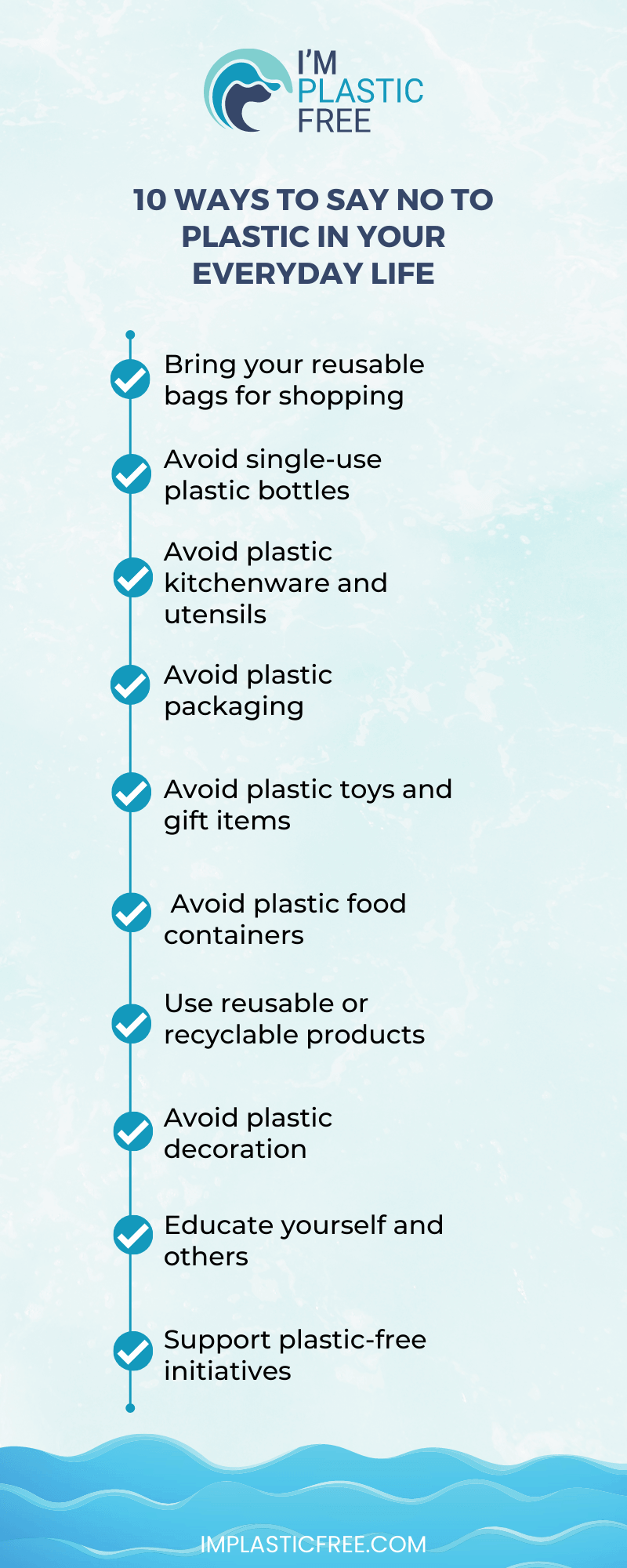
Download the Infographic (PDF)
1. Bring Your Reusable Bags for Shopping

Most carry bags used by shop owners are made of plastic which is handed over to the customer to carry the materials purchased. A very good practice is to bring your reusable bags for shopping that can’t be thrown to waste afterwards. This habit has a direct impact on reducing plastic waste. The shopkeepers are bound to stop using plastic carry bags since these have no use. We should all consider it a responsibility to say no to plastic carry bags and make our environment cleaner.
2. Avoid Single-use Plastic Bottles
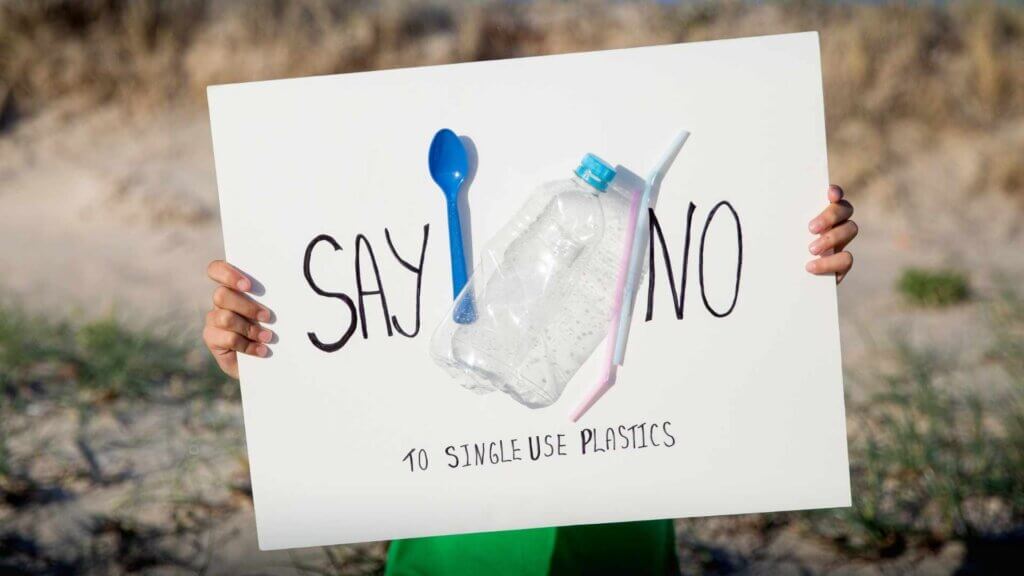
Plastic water bottles are used everywhere for the convenience of storing and use but only add to the garbage after disposal. Furthermore, recent studies have shown that, on average, a liter of bottled water included about 240,000 microplastics, aka, tiny pieces of plastic. Therefore avoiding single-use plastic bottles is a committent to your health!
The healthier and more eco-friendly option is to use glass, or stainless steel bottles. These small steps would help address the waste issues caused by plenty of single-use plastic bottles discarded every day. When travelling, or exploring national parks and the great outdoors, bringing a durable, reusable water bottle is an excellent way to stay hydrated and minimize your environmental footprint.
A part from plastic bottles, most of the coffee cups we use are also made of non-biodegradable materials that end up as garbage affecting the environment. It’s better to avoid plastic bottl carry a reusable coffee cup and make perfect use of it, avoiding disposable cups.
Related: Microplastic in Water Bottles – How Dangerous is It?
3. Avoid Plastic Kitchenware and Utensils

Replace plastic containers with reusable glass or metal jars and go for products in recyclable and plastic-free packaging. Plastic-free household products can significantly improve our environment by reducing pollution. Avoid using plastic cutlery, straws, and accessories, which pile up in landfills or chock the waterways with plastic disposables. You can make the best use of reusable containers and utensils to save yourself from the consequences of plastic pollution. Stainless steel cutleries, food ware with washable options, and reusable glass or metal containers can significantly reduce plastic pollution.
Related: Creating a Sustainable Kitchen: The Best Plastic-free, Non-Toxic Small Kitchen Appliances
4. Avoid Plastic Packaging
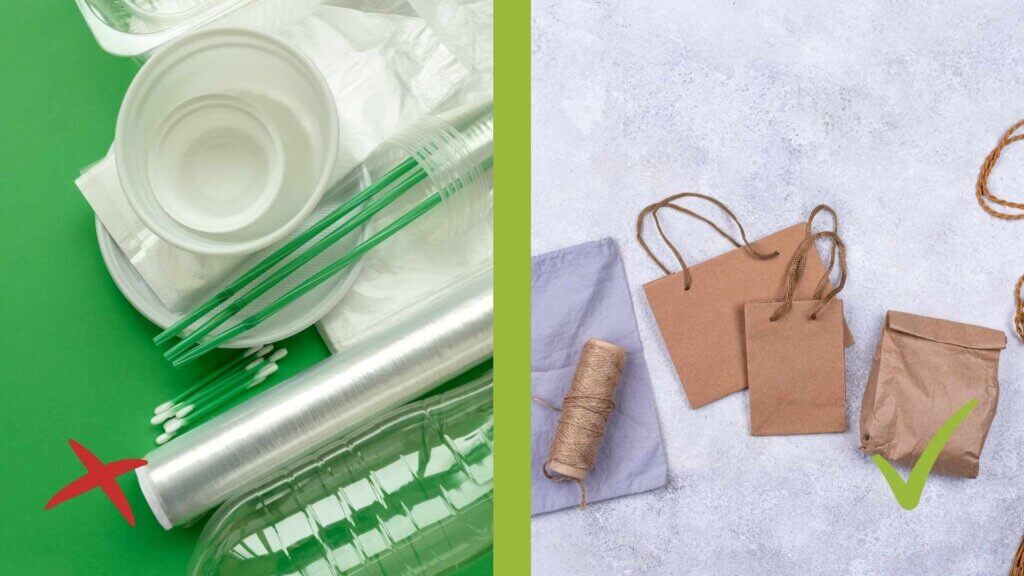
Avoid purchasing products in plastic pouches or plastic wraps and insist on biodegradable and recyclable packaging materials. Many alternative packaging materials are available today with the same qualities as plastic but are much less harmful to the environment.
Use paper bags instead of plastic gift wraps (but only if you’ve forgotten your reusable bag!), avoid consumables packaged in plastic, and opt for products with refill options. Choose products contained in glass bottles or cardboard boxes that are easily disposable. Most of our daily use items, including consumables, foods, medicines, and personal care products are available in plastic packaging, so we must shift to products with reusable and recyclable packaging.
Related: 7 Creative Ways to Embrace Biodegradable Alternatives to Plastic that Make a Difference
5. Avoid Plastic Toys and Gift Items
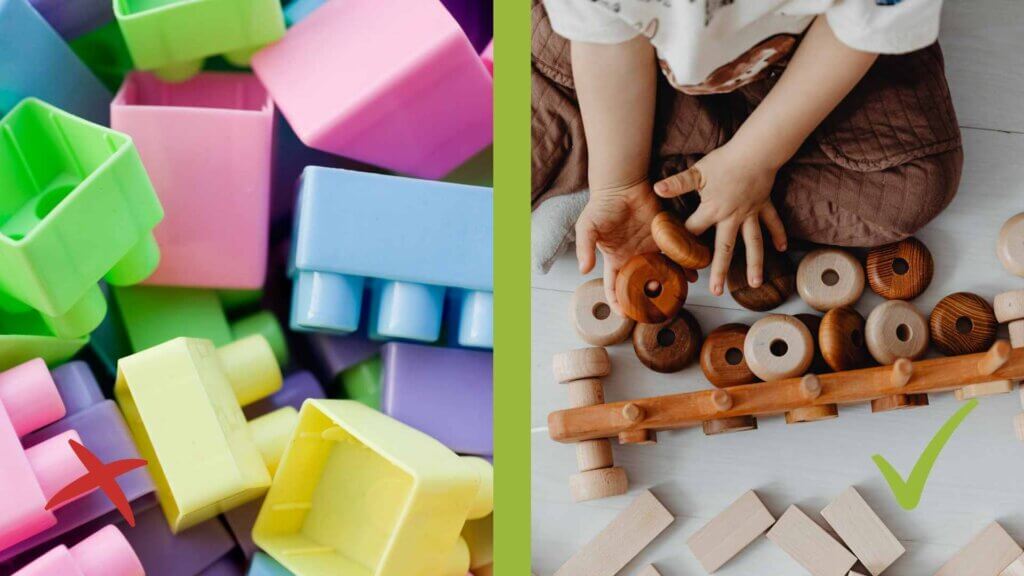
Plastic toys are common for kids but also harm health and the environment. Good alternatives like wooden, rubber, and cloth toys and gift items are available in attractive designs. These items are made of natural material that doesn’t produce any harmful effects. These can be beautifully crafted and designed in various shapes and sizes with attractive looks. The materials are biodegradable, recyclable, and/or compostable, making them eco-friendly toys without plastic.
Related: Plastic Free Toys: Do Eco-Friendly Alternatives to Plastic Toys Exist?
6. Avoid Plastic Food Containers
Plastic containers have been used extensively for packing foods, especially for home delivery which is a major source of waste. We should strictly avoid packing foods in plastic containers particularly if the food is hot as this comes with some risks in the long term. Communicate and encourage the supplier or vendor to make delivery of food items in recyclable packaging or opt for refill options using your reusable containers.
Related: Is it Harmful To Store Food In Plastic Containers?
7. Use Reusable or Recyclable Products and Packaging
You can bring some changes in habits by using reusable items instead of single-use materials that would help keep the environment clean with less waste generation. Use more reusable options in your daily routine, like toiletries, kitchenware, travel kit, medicines, food packaging, and domestic products. Branded recyclable items are a good alternative to plastics with certified compostable properties.
Tips:
- Avoid single-use plastics
- Use shopping bags made from sustainable materials
- Make a plan and identify ways to reduce plastics in your everyday life
- Avoid kitchenware made from plastics
- Switch to plastic-free toothpaste in reusable, recyclable jars.
8. Avoid Plastic Decorations
Decorations are an integral part of any event that uses a lot of plastic and synthetic materials. These are mostly non-reusable and produce a major quantity of litter. Look for vendors who are experts in using beautiful decorating items with biodegradable or recyclable materials. Avoid using plastic balloons and use paper-made decorating materials to grace the occasion. The best way to decorate the event is to use natural plants and flowers that improve the aesthetics and looks.
9. Educate Yourself and Others
Plastic waste has become a great concern, so there should be more awareness about plastic free, sustainable products that would provide several benefits. There are different networks and resources available that can effectively be utilised to handle the promotion of plastic free alternatives and their utilities. Educating yourself and others about the negative impact of plastics can be a great impetus to focus people’s attention on avoiding plastics and go for reusable or recyclable product options.
Related: 45 Catchy No Plastic Slogans
10. Support Plastic Free Initiatives
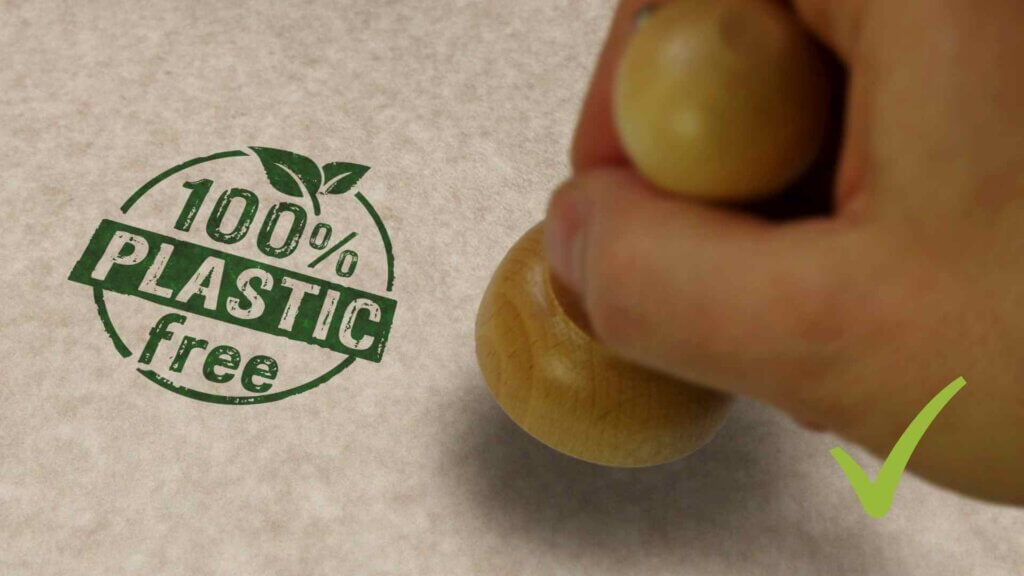
Businesses are adopting innovative strategies across the value chain to impact the environment and respond to customer expectations positively. You should advocate for businesses that avoid plastics and modify their processes to ensure materials’ effective reuse and recycling. Such changes in business policy and practices will lead to less production and consumption of plastic products, reducing the environmental impact of plastic significantly.
Here are the top things you can do to support plastic free initiatives.
- Buy from businesses that have adopted plastic free packaging and plastic free catering
- Support non-profits advocating for plastic free places like the homonym Australian organisation Plastic Free Places.
- Buy sustainable and zero-waste products
- Support eco-friendly and ethical brands
Related: 5 Tips for Creating a Plastic Free Catering Event
Conclusion
Increasing plastic pollution is a serious concern for our environment, and we must take some conscious steps to address this problem. We are free to make our lifestyle choices, but should also consider contributing to reducing plastic pollution. Some changes in our habits and lifestyles can significantly reduce the use of plastics and create a huge impact in improving our environment.
—
Browse the I’m Plastic Free directory to discover plastic pollution solutions.


